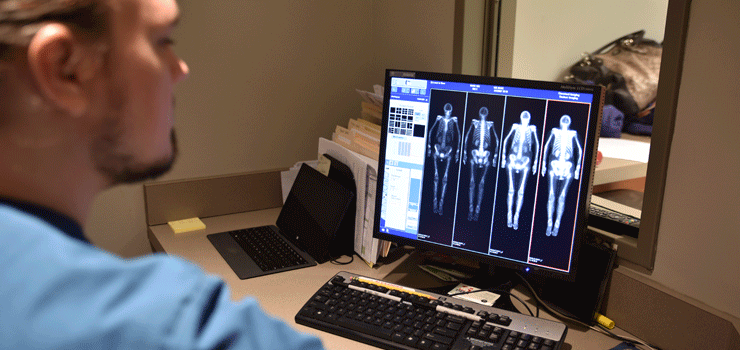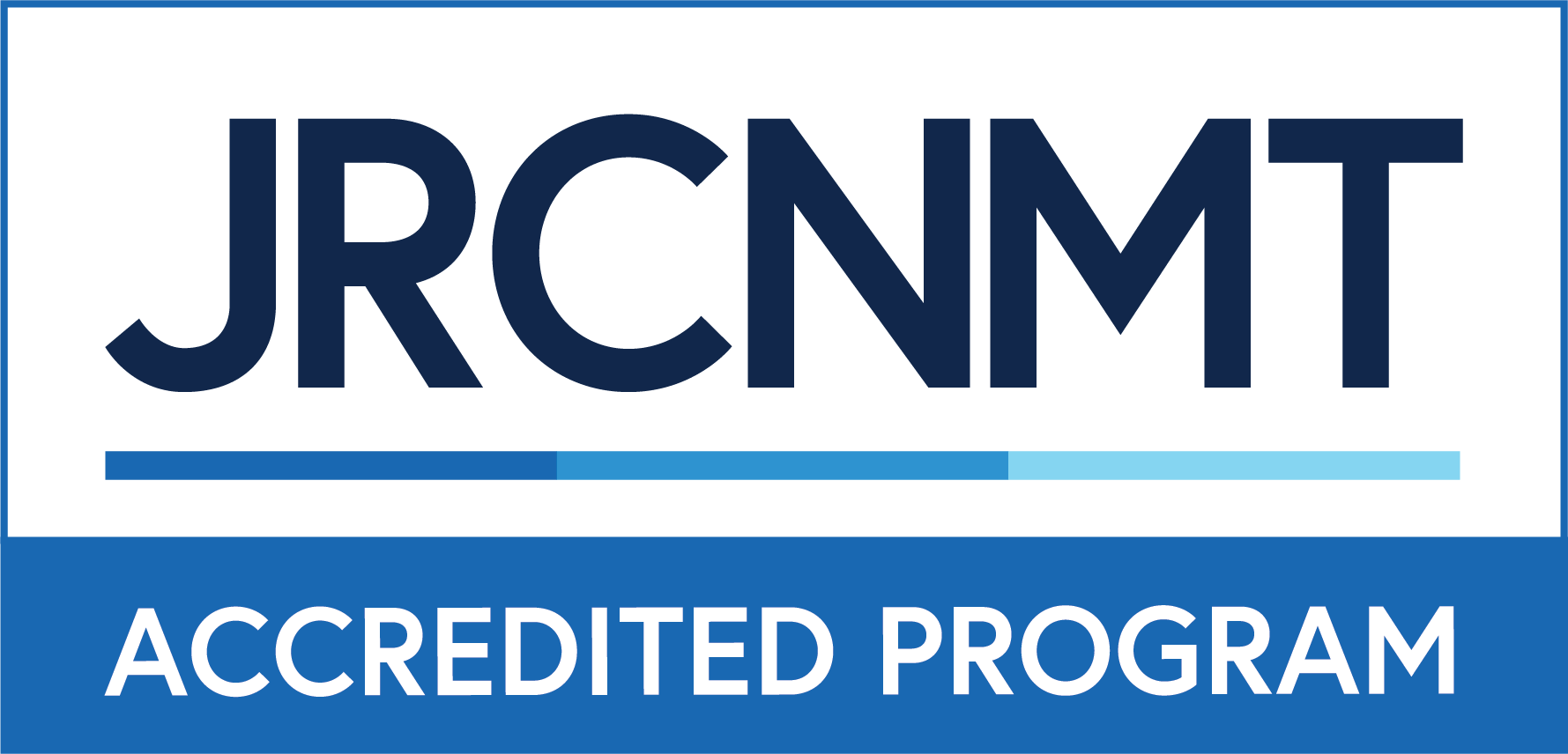Nuclear Medicine Technology - A.A.S.
Questions / More Information
(423) 697-4450 | Request Information
Deadline Dates
Program Admission

It is mandatory that all students attend an information session each academic year, even if they have attended in a previous year. There are two ways to experience a Nuclear Medicine Technology info session, and both are valid.
Who are Nuclear Medicine Technologists?
Nuclear Medicine Technologists are members of the diagnostic imaging health care team. The technologists actively participate in the performance of diagnostic imaging procedures which analyze both the anatomy and physiology of the human body. Nuclear Medicine imaging procedures are performed through the administration of a radioactive pharmaceutical which is then analyzed with gamma cameras. In addition, Nuclear Medicine Technologists use radioactive drugs for therapeutic procedures involving certain diseases.
Choose Your Program
Chattanooga State offers two Nuclear Medicine Programs:
- AAS Degree
You are currently on the webpage for the Nuclear Medicine Technology AAS Degree. This Degree is designed for individuals without a prior degree.
- Certificate
The certificate program caters to those with a degree and patient care experience.
Program Information
The Nuclear Medicine Technology Associate in Applied Science program is a full-time online program, conducted over WebEx, with interested AAS students beginning each spring with a prerequisite course, NUCM 1100 Patient Care in Imaging. If accepted the student will continue into summer clinical and then begin the fall semester and continuing through the following spring and summer semesters. Students must periodically come on campus to exchange dosimetry badges, and they must perform clinical rotations at a site affiliated with the college. These sites are located in Alabama, Georgia, Kentucky, Tennessee and West Virginia--ONLY.
-
The NMT AAS program consists of 69 semester credits. Classes and clinics are integrated to require 40 hours per week.
-
The NMT AAS program lasts 15 months. It begins with the spring course, NUCM 1100 Patient Care in Imaging, and continues to the following August.
- The NMT AAS program also provides preparation for the ARRT and/or NMTCB certification exams in nuclear medicine technology.
- The NMT AAS program faculty are very involved in the Society of Nuclear Medicine and Molecular Imaging, have held national offices, and are well respected in the nuclear medicine community.
- The NMT program offers study-abroad opportunities. Students in the program have traveled to Portugal, England, and Australia.
- The NMT AAS program has requirements for applicants which can be found on the Nuclear Medicine Technology - Application Checklist.
Accreditation
The Nuclear Medicine Technology program is an accredited program, therefore, graduates are eligible to take both the Nuclear Medicine Technology Certification Board Exam (NMTCB) and the American Registry of Radiologic Technologists (ARRT) Nuclear Medicine board exam upon graduation. Attempting either or both of the exams is not a requirement of graduation, however, many employers require certification/registration as a criteria for employment. In addition, some states require licensure as a condition for employment. Though many states will accept the NMTCB and ARRT credentials in lieu of sitting for a state licensure exams, it has not been determined whether this program satisfies the requirements of all states and territories for licensure. It is the responsibility of the applicant to inquire of the state licensure board within which they live or plan to work in order to determine whether graduation from this program meets state requirements.

Joint Review Committee on Educational Programs in Nuclear Medicine Technology (JRCNMT)
820 W Danforth Rd, #B1
Edmond, OK 73003
Phone: (405) 285-0546
Fax: (405) 285-0579
mail@jrcnmt.org
Mission
The Nuclear Medicine Technology Program provides educational opportunities that reflect the current practice of nuclear medicine technology, resulting in high-quality patient care by competent, professional, entry-level nuclear medicine technologists through various didactic and clinical experiences.
Goals
- To provide an exceptional collaborative program that addresses the societal demand for skilled and capable medical imaging and therapeutic professionals in association with our partner institutions.
- To educate individuals in nuclear medicine to become knowledgeable, confident, and responsible healthcare providers.
- To foster the growth of intellectual abilities, professional attitudes, and values that will facilitate constant learning and development beyond graduation.
- To assist students and graduates in obtaining career opportunities that use relevant knowledge, skills, and personal attributes.
Program Outcomes
Upon completion of this program, the student will:
- Perform all daily operations of the laboratory, including: the appropriate receipt, disposition and documentation of radioactive materials, instrumentation and radiopharmaceutical quality control, clinical procedures and medical records;
- Assess the appropriateness of the requested clinical procedure to the patient’s condition, medical history, and the pathology under consideration;
- Assess patient condition and initiate emergency lifesaving measures;
- Communicate effectively with patients to ensure patient preparation, cooperation, safety and comfort;
- Apply knowledge of radiation physics, radiation safety and governing regulations in order to limit radiation exposure to the patient, public, fellow workers and self as low as reasonably achievable (ALARA);
- Prepare and administer radiopharmaceuticals and other agents used in conjunction with nuclear medicine procedures to patients by intravenous, aerosol and oral methods according to proper medical procedure;
- Understand and utilize radiation detection devices and other equipment to measure the quantity and distribution of radionuclides in patients, patient specimens, or the physical surroundings.
- Properly utilize imaging devices and external detectors to perform in-vivo and in-vitro diagnostic procedures in a manner which maximizes quality and benefits to patients;
- Perform and analyze all quality control techniques associated with the handling of radionuclides and nuclear medicine equipment;
- Use computer systems for the acquisition, processing and presentation of nuclear medicine procedures;
- Incorporate cognitive, psychomotor, and affective skills in order to work in a productive, cooperative, efficient and effective manner with both inter and intra departmental personnel;
- Participate in acquisition and maintenance of supplies and equipment in a manner which is consistent with the requirements for safe and effective workplace performance;
- Participate in the maintenance of documentation required by various regulatory agencies;
- Participate in departmental inspections conducted by various licensing, regulatory and accrediting agencies;
- Participate in scheduling and coordination of patient examinations.
- Understand the role of nuclear medicine technology in the overall delivery of healthcare.
- Demonstrate the ability to perform therapeutic procedures with concern for ALARA, patient care and management, and governing regulations.
Success Rates
Graduate Achievement Data: https://www.jrcnmt.org/students/graduate-achievement-data
Career Opportunities
Career advancement opportunities in nuclear medicine technology are excellent. Employment opportunities are abundant across the USA for graduates who have passed the registry exam. Hospitals and clinics nationwide require qualified nuclear medicine technologists to meet the growing demand for patient services. This creates diverse job opportunities in supervision/management, education/research, and positron emission tomography.
The career of a nuclear medicine technologist can advance in various directions:
- Supervision/Management
- Education/Research
- Positron Emission Tomography
The graduate qualifies to apply to obtain certification to the modalities listed below. These programs are offered by Chattanooga State:
- Computed Tomography
- Diagnostic Medical Sonography
- Magnetic Resonance Imaging
- Ability to move wheelchairs, stretchers, etc., alone or with assistance as available. Must be able to lift, support, and/or transfer a morbidly obese patient in a 2–3 person transfer.
-
Ability to visualize patient for identification, positioning, camera placement and alignment and image analysis. Ability to move the body and body regions in order to provide patient care and support and to position patient for imaging and/or treatment.
-
Ability to reach, position, and operate imaging tables, camera control panels, collimators, dose calibrators, etc., at standard locations and placements.
-
Ability to safely administer radiopharmaceuticals and appropriately handle vials, syringes, sterile items, pharmaceuticals, catheters, IVs, etc.
-
Ability to read written passages, to communicate orally and to write. Ability to hear or lip read for reception of spoken communication.
-
Ability and stamina to withstand lengthy periods of physical activity including moving quickly and continuously.
-
Ability to perceive events realistically, to think clearly and rationally and to function independently in routine, stress and/or emergency situations.
-
Ability to properly visualize and distinguish subtle changes in image detail.
-
Ability to properly label images with information necessary for identification and interpretation and evaluate the quality of the image for accuracy.
Program Cost
| First Semester (5 hours) (summer) | In-state | Out-of-state eRate |
|---|---|---|
| Maintenance Fee | 952.00 | 1382.00 |
| Nursing & Allied Health Fee | 25.00 | 25.00 |
| Truescreen: myRecord Tracker Fee: | 17.50 | 17.50 |
| Upload documentation for: | ||
| Physical Examination | 300.00 | 300.00 |
| Hepatitis B (estimate) | 175.00 | 175.00 |
| CPR | 25.00 | 25.00 |
| Truescreen Criminal Background Check | 24.50 | 24.50 |
| Truescreen Drug Screen (12 panel) | 39.00 | 39.00 |
| TB Skin Test | 65.00 | 65.00 |
| Liability Insurance | 11.05 | 11.05 |
| Radiation Badges (estimate) | 75.00 | 75.00 |
| Uniform | 200.00 | 200.00 |
| Labcoat | 30.00 | 30.00 |
| Trajecsys | 100.00 | 100.00 |
| Textbooks (estimate) | 200.00 | 200.00 |
| Subtotal | 2239.05 | 2669.05 |
| Second Semester (15 hours) fall | In-state | Out-of-state eRate |
|---|---|---|
| Maintenance Fee | 2326.00 | 4010.50 |
| Nursing & Allied Health Fee | 375.00 | 375.00 |
| Textbooks (estimate) | 800.00 | 800.00 |
| Subtotal | 3501.00 | 5185.50 |
| Third Semester (13 hours) (spring) | In-state | Out-of-state eRate |
|---|---|---|
| Maintenance Fee | 2252.00 | 3497.50 |
| Nursing & Allied Health Fee | 325.00 | 325.00 |
| Textbooks (estimate) | 200.00 | 200.00 |
| Subtotal | 2777.00 | 4022.50 |
| Fourth Semester (12 hours) (summer) | In-state | Out-of-state eRate |
|---|---|---|
| Maintenance Fee | 2215.00 | 3247.00 |
| Nursing & Allied Health Fee | 300.00 | 300.00 |
| Textbooks (estimate) | 123.00 | 123.00 |
| ARRT | 200.00 | 200.00 |
| Passport Photo for ARRT(N) Application | 15.00 | 15.00 |
| Subtotal | 2853.00 | 3885.00 |
| Total | 11906.00 | 15776.05 |
Costs Disclaimer
These are estimated program costs. Actual costs may vary due to changes in tuition and/or fee increases as determined by the Tennessee Board of Regents. This cost will also be reduced for students since some of the required course work is completed prior to acceptance into the program. These general and support courses taken before the program is to lessen course load in a given semester.
Note: College fees are included in the maintenance cost. To view current calculation table, go to Bursar’s Office on Chattanooga State website. This website will also give you information on refund policies, fee payments and the refund calendar.
